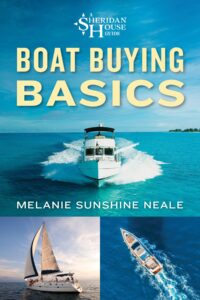Sunshine Cruising Yachts Blog
Red Flags When Choosing a Yacht Broker

A good broker can make the difference between a smooth, successful transaction and a stressful, costly mistake. Yacht brokers are there to guide you through one of the more significant financial decisions you’ll make—so it’s essential to choose wisely. Unfortunately, not all brokers operate with the same level of professionalism or integrity.
Here are some key red flags to watch out for when choosing a yacht broker:
- Lack of Licensing or Accreditation
Even though Florida and California are the only states where yacht brokers are required to be licensed or bonded, a professional broker should still be affiliated with respected industry organizations such as:
- CPYB (Certified Professional Yacht Broker)
- IYBA (International Yacht Brokers Association)
- YBAA (Yacht Brokers Association of America)
If your broker can’t provide credentials or isn’t affiliated with any reputable associations, that’s a red flag.
- Conflict of Interest
Watch out for brokers who seem more interested in pushing certain listings OR products in helping you find the best fit. This is especially relevant when it comes to their own services unrelated to brokering…a broker who is a mechanic shouldn’t try to sell you a boat and tell you that it needs extensive mechanical work. If a broker seems to prioritize their commission over your needs, be wary.
Ask directly:
- “Are there other listings you would recommend from outside your firm?”
- “What other businesses are you involved with?”
- “How do you decide which yachts to show me?”
- Questionably definitive statements and advertising
Statements in advertising such as, “We sell the most boats,” “We have the best advertising,” “We are the most knowledgeable brokers,” and the like are red flags. Unless these statements are factual and supported by data, they are simply advertising lingo. Look, instead, for substantiated language such as, “Our brokers have a total of 40 years of combined boating knowledge,” or “All of our brokers are members of a professional association.”
- Limited Market Knowledge in YOUR market
A good broker knows the market: what boats are worth, how long they typically take to sell, and what buyers are looking for. If a broker can’t answer basic questions about the type of yacht you’re considering—or seems to be guessing—they may lack the experience needed to guide you properly. A broker who specializes in fishing boats might not be the best broker to help you find a sailing catamaran.
Ask:
- What similar yachts have sold recently?
- What do they estimate as a fair market value?
- How do they determine market value (comps, personal assessment, etc.)?
- How would they position your yacht (if selling) or negotiate on your behalf (if buying)?
- No Transparent Fee Structure
Always ask upfront how the broker is compensated. The standard commission for yacht sales is around 10%, usually split between the listing and selling brokers. If you get vague answers or discover hidden fees later in the process, it could be a sign of shady practices.
Red flag phrases:
- “Let’s talk about commission later.”
- “Don’t worry about that now.”
- “There’s a small administrative fee…you’ll see it on the invoice.”
- Negative or No Client Reviews
This is a big one! Word of mouth and online reviews are valuable tools when selecting a broker. If you can’t find any reviews, or you find a consistent pattern of complaints about the same issues—such as dishonesty, delays, or unprofessional conduct—take it seriously. No reviews are just as negative as bad ones.
Tip: Check reviews on:
- Social media groups for boating and yachting
- Testimonials on the brokerage’s website (even though these come from the broker’s site, they are curated elsewhere)
- No Written Agreements or Contracts
A professional broker will always provide a clear contract outlining terms of representation, commission, duties, and timelines. If your broker insists on verbal agreements or hesitates to provide documentation, this is a major red flag.
- Pushy Sales Tactics
You should never feel pressured to make a hasty decision. High-pressure tactics—like warning you a boat will sell immediately or urging you to bid over market value without justification—can be signs that the broker is putting their own interests first.
Final Thoughts
Choosing the right yacht broker is crucial whether you’re buying your dream yacht or selling one you’ve outgrown. Trust your instincts, do your research, and don’t be afraid to walk away if something doesn’t feel right.
A good yacht broker is your partner in the process—transparent, knowledgeable, responsive, and working in your best interest. If you spot any of these red flags, keep looking. The right broker is out there, and they’re worth the wait.
What’s Happening in the Boat-Buying Economy in 2025?
The boat-buying market is riding through interesting waters in 2025, offering both opportunities and challenges for buyers and sellers. After a dynamic few years, marked by post-pandemic demand surges and evolving market conditions, understanding the current economic landscape is key to making informed decisions.

Market Trends
- Demand Stabilization: While the pandemic fueled a sharp rise in boat sales, the frenzy has calmed, leading to more stable pricing and reduced competition. This shift creates opportunities for buyers to negotiate better deals.
- Higher Interest Rates: Interest rates remain elevated compared to historical lows, impacting financing options for many buyers. While this increases the overall cost of boat ownership, it has also tempered speculative demand, making the market more balanced. Let Laurie Kiser at Ocean Point Marine Lending help you with this!
- Inventory Improvements: Supply chain challenges that plagued manufacturers in recent years are easing. New boat inventory is replenishing, giving buyers more options and shorter wait times compared to previous years.
Tips for Buyers
- Consider Pre-Owned Boats: The pre-owned market offers value, especially with lightly used vessels now more available. Buyers can avoid depreciation associated with new boats while securing quality options at competitive prices.
- Lock in Financing Early: If financing, it’s smart to shop around and secure favorable terms early. Rate hikes may continue, so a proactive approach could save thousands.
- Work with a Trusted Broker: A knowledgeable broker helps buyers navigate the complexities of boat transactions, ensuring fair pricing, thorough inspections, and seamless documentation.
Today’s boat-buying economy poses unique challenges, but it also provides excellent opportunities for those prepared to act wisely. Whether you’re upgrading, downsizing, or purchasing your first boat, staying informed about market conditions and working with professionals can help you sail smoothly into ownership.
New Year’s Resolutions: Goals for Every Boater
As the new year begins, it’s the perfect time to reflect on past adventures and set fresh intentions for the year ahead. For sailing enthusiasts, resolutions can focus on improving skills, enhancing safety, or embracing new challenges on the water. Here are some inspiring New Year’s resolutions for sailors of all levels:
1. Sharpen Your Navigation Skills
In today’s tech-driven world, it’s easy to rely on GPS and chartplotters. This year, challenge yourself to master traditional navigation methods. Brush up on your chart reading, dead reckoning, and celestial navigation to become a more self-reliant sailor.
2. Invest in Safety Gear
Safety should always be a priority. Take stock of your current safety equipment and upgrade or replace anything that’s outdated. Consider adding items like a personal locator beacon (PLB), AIS system, or advanced first aid kit to your inventory.
3. Reduce Your Environmental Footprint
Commit to eco-friendly boating practices. Use biodegradable cleaning products, minimize single-use plastics, and ensure proper waste disposal. If you’re ambitious, explore ways to retrofit your boat with solar panels or energy-efficient systems.
4. Expand Your Sailing Horizons
Set a goal to explore new destinations or tackle a longer passage. Whether it’s an overnight trip to a nearby island or a transoceanic journey, pushing your boundaries will create unforgettable memories.
5. Take a Sailing Course
Education is key to growth. Enroll in a course to enhance your skills—whether it’s advanced anchoring techniques, racing strategies, or storm sailing. There’s always more to learn!
6. Teach or Mentor
Share your passion for sailing by teaching someone new. Offer to mentor a novice sailor, volunteer with a local sailing club, or introduce friends and family to the joys of life on the water.
7. Maintain Your Boat Like a Pro
This year, make a detailed maintenance schedule and stick to it. Regularly inspect your rigging, engine, and hull to prevent small issues from becoming big problems. A well-maintained boat is safer and more enjoyable.
8. Log Every Journey
Keep a detailed log
of your trips. Recording weather conditions, routes, and lessons learned not only builds a personal sailing history but also helps you improve your skills over time.
9. Give Back to the Community
Participate in events like harbor cleanups or fundraisers that support maritime causes. Giving back strengthens the sailing community and ensures the waters remain beautiful for future generations.
10. Sail More Often
The simplest resolution of all: make time to sail more. Whether it’s a quick day sail or an extended cruise, prioritize getting out on the water as often as you can.
Final Thoughts
New Year’s resolutions are a great way to enhance your sailing journey. Choose a few goals that resonate with you, and take steady steps toward achieving them. With dedication and passion, 2025 could be your best year on the water yet. Happy Sailing!
How to Decorate Your Boat for the Holidays: Tips for Festive Fun Afloat
Below: A decorated boat in the St. Augustine Regatta of Lights in St. Augustine, FL

The holidays are a time for joy, celebration, and creativity—so why not bring that festive spirit to your boat? Whether you’re docked or cruising, holiday decorations can transform your vessel into a floating winter wonderland. Here’s how to make your boat the star of the season:
1. Choose a Theme
Pick a cohesive holiday theme to guide your decoration. Whether it’s classic red and green, coastal chic with seashells and silver, or a whimsical candy cane motif, a theme ensures your decor looks polished and festive.
2. Light It Up
LED string lights are a boat owner’s best friend! Opt for waterproof and battery-operated lights to wrap around railings, masts, or even along the hull. Multicolored lights or warm white can set the mood, and solar-powered options are eco-friendly and easy to maintain.
3. Deck the Deck
Garlands, wreaths, and bows are perfect for sprucing up the deck. Use nautical accents like ropes or anchor-shaped ornaments to tie the decor to your boat’s identity. For a standout feature, hang a holiday wreath on the bow.
4. Create a Holiday Focal Point
If space allows, set up a small Christmas tree on the deck or cabin. Secure it with bungee cords to keep it stable. Alternatively, use a tabletop tree or decorate with miniature ornaments in key areas.
5. Personalize Your Decor
Add a personal touch with custom decorations like a nameplate for your boat in festive colors or a banner wishing “Happy Holidays” or “Season’s Greetings.”
6. Don’t Forget Safety
Ensure all decorations are secure and won’t obstruct navigation lights or safety equipment. Avoid decorations that could pose a fire hazard, and use clips or suction cups instead of nails or adhesives that could damage your boat.
7. Host a Holiday Dock Party
Invite friends and family to admire your festive masterpiece. Add music, holiday treats, and warm beverages for an unforgettable gathering on the water.
Decorating your boat for the holidays is a wonderful way to spread cheer and showcase your holiday spirit. So, gather your supplies, crank up the carols, and let your creativity shine. Happy Holidays from the water!
Hey! Guess what? My new book, Boat Buying Basics, is already for sale on Amazon.
Before you choose a broker, here are some things to consider.
(Originally Published in Practical Sailor)
Responsiveness. How quickly a broker responds to your inquiry is indicative of how they will respond to potential buyers. Give them 24 hours, and move on if they don’t respond or if they make excuses as to why they didn’t respond promptly. Most, if they miss the initial phone call, will call or email you back within minutes.
Marketing. Ask where else the broker will advertise your boat and expect to receive a written list of websites and print publications and social media.
Look at other listings. Ask a potential broker for links to some of their listings. If you don’t like the write-up, think the photos are shoddy, or if there isn’t enough information, move on.
Comps. The average buyer and seller, despite what they might find perusing ads and looking at resources like BUC, do not have access to actual comps. Your broker does. In addition to knowing what is currently on the market, your broker should offer you information on how many similar boats have sold in your region recently, what they were listed at, how long they took to sell, and exactly what they sold for.
Track record. Ask your broker what he/she has sold recently. A good broker will be ready with the answer.
Paperwork, escrow, and protection during the closing process. A broker will have an escrow account and will ask that all deposits be submitted to the account. The broker will have all the forms you need, and some even use programs which simplify the process through e-signing. The broker works with a title/documentation company, and the buyer pays for all expenses associated with closing.
Import duty. If you have purchased a foreign-built boat and plan to sell it in the US to a US citizen (regardless of your citizenship), import duty must be paid. Your yacht broker will help you find a customs broker. Be wary of brokers who suggest ways to get around paying the import duty, such as closing offshore. If you are selling the boat yourself and fail to comply, both you and the buyer are liable for huge fines down the road.
Social Media. If this is something that the broker claims to do, ask where they post, what kinds of accounts they have, and how many followers they have. Posting on a personal Facebook page to 200 of the brokers closest friends is not enough. The post needs to be publicly shared on various forums.
Personality. You and your broker are forming a relationship, and chances are that you are already somewhat emotional about the sale of your boat. Your broker needs to understand this and be open and honest with you. Why work with someone you don’t like?
Melanie Neale is a lifelong cruising sailor, author, and mother. She is the owner of Sunshine Cruising Yachts.
Explore her books:






